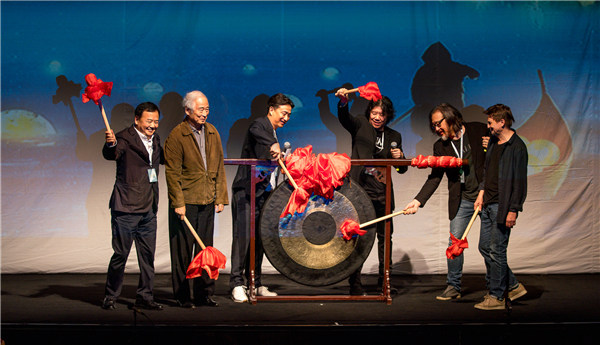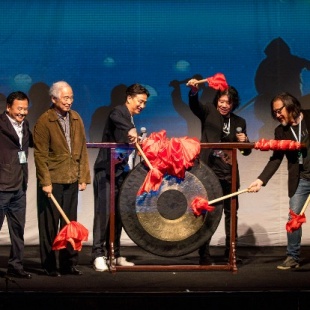Crowds flood in, the roots take hold and theater flourishes


For the actor Huang Lei it was the perfect curtain raiser: a day before the Wuzhen Theatre Festival opened its seventh edition on Oct 25, he and his wife, the actress Sun Li, celebrated 24 years of being together.
"I met her when I was 24. Now after 24 years, the time I have been with her has exceeded the days I didn't know her," says Huang, one of the co-founders of the festival.
They have performed as a pair of star-crossed lovers in the classic play Secret Love In Peach Blossom Land by Stan Lai. For every performance, Huang and Sun made it their practice to give each other a kiss after the lights went out.
"After more than 500 performances I have come to realize that drama and life are one and the same," Huang says. "Holding on to one thing, whether it is theater or love, you harvest something special."
Huang says he hopes to keep the festival going until it becomes so much a part of the ancient town of Wuzhen that no one can recall a time when it did not exist.
This year's festival, from Oct 25 to Nov 3, ran under the theme of "Emerge", indicating the creative ideas that are constantly evolving in the town.
The festival presents an incredibly dynamic scene as theater practitioners and theatergoers gather for the annual celebration, and the scale of the performances continued to gain recognition around the world.
In the space of 10 days 28 theater productions from 13 countries and regions were staged, and around 2,000 outdoor carnival performances and 34 panel discussions took place.
Meng Jinghui, theater director and one of the founders of the festival, says: "The Wuzhen Theatre Festival to me is a nutritional reservoir that cultivates both practitioners and spectators, making practitioners more confident and diversified, while encouraging spectators to be more tolerant."
The opening play was Anton Chekhov's Three Sisters, staged by the Russian director Yury Butusov, retaining the festival's emphasis on classical theater works, which Huang says should be a vital component of any theater festival.
"Great works can be interpreted and watched many times and in many different ways," Huang says, noting that the audience may not fully understand the play.
"Progress is driven by ignorance. I am especially grateful for my own ignorance, which, for many times in my life journey has let me know that I can go a little further."
Some European directors who visited the Wuzhen festival said Chinese theater audiences are very different from European ones.
"I have a feeling that because of their geographical situation, Chinese audiences have not been exposed to the evolution that European theater has undergone over the past 50 years," the Italian director Eugenio Barba said.
"So in this sense Chinese audiences are different. They are more pure in a way."
The Polish director Michal Znaniecki described the festival and its audiences as vibrant.
"The shock that we have in Wuzhen is to see a lot of people with a special interest in theater… It's really very special, and you see that the audience is very participative. They know why they are here; they listen and they want to learn."
Barba has been a steadfast presence at the festival from the outset, and acted as honorary chairman in its second year, when it was "trying to find its own profile". At this year's festival it was clear that the event has indeed established deep roots and an identity for itself, he said.
"The festival should become like Mecca, and people should come to see what's happening in this Mecca. What is fascinating is that audiences travel to come and see a performance, and in fact become pilgrims."
With seven years under its belt the aim is for the festival to continue to flourish next year, "Flourish" having been announced at the closing ceremony of this year's event as the theme for next year. The festival will run from Nov 5 to Nov 15.





































